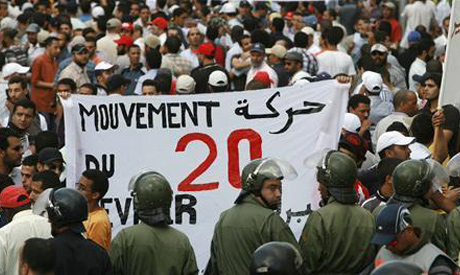
Police face protesters pushing for democratic reforms during a rally organised by the country's so-called ''February 20'' street movement in Morocco's main economic hub Casablanca July 3, 2011 (Photo: Reuters)
Morocco's 20 February movement, born during the Arab Spring uprisings and increasingly marginalised in the two years since then, is hoping to rebound amid rising discontent against the Islamist government.
Tens of thousands of Moroccans took to the streets in the kingdom on February 20, 2011 after protests had already overthrown dictatorships in Tunisia and Egypt.
But since then, a new constitution and government have been put in place, and the number of people affiliated with the movement has dwindled. In recent months, its demonstrations have struggled to gather even a few hundred people.
The movement celebrates its second anniversary on Wednesday with a rally in front of parliament at around 1700 GMT.
"Politically the February 20 movement does not exist," said Baudouin Dupret, director of the Jacques-Berque Centre in Rabat, as he talked of the "chilling impact" of the outcome of the revolutions that erupted in neighbouring countries.
The movement's influence was undermined to a large extent by the adoption of the constitution by an overwhelming majority in the second half of 2011 -- giving enhanced powers to the government -- and the historic victory for the Islamist Justice and Development Party.
Sanae Metaich, a 20 February coordinator in Rabat, said that "after the adoption of the constitution we talked less about ourselves in the media and then we had a party that took power using our slogans" of anti-corruption and pro-democracy.
"The movement was also deprived of a large part of its troops," as those from the powerful Justice and Charity party, which is tolerated but officially banned for its opposition to the monarchy, withdrew from the demonstrations.
Samad Ayach, another 20 February coordinator, said: "The regime has played the card of the constitution and elections on one hand and repression on the other."
About 70 activists were behind bars at the end of December, according to a coalition of Moroccan human rights groups.
Metaich said there has also been a change in the methods of repression.
"Before, they were arrested for participating in unauthorised demonstrations. Now it is for violence against law and order forces and drug trafficking."
Heavy penalties have also sometimes been imposed on activists, with one in Al-Hoceima in the north sentenced to 12 years in prison in October.
"Activists are not sacred people," said Prime Minister Abdelilah Benkirane when asked about such sentencings.
"The majority of reforms have been carried out. You don't see 20 February anymore. Okay, there are some who want to resurrect it. We will see," he said.
But the movement questions the extent of progress made over the past two years and calls for "genuine democracy".
"We don't have a real organisation, a real political strategy and communication with the people at the grassroots level. We need to be more effective," acknowledged Ayach.
The movement is now hoping to ride on what it sees is rising discontent against the government amid a slowing economy.
"Citizens will realise that they need a new change," said Metaich.
But Dupret says that, until then, "February 20 will never be able to convert a contested political disorder into social protest."
"There have been parallel social protests" by unemployed graduates, "but the connection was never made."
Short link: